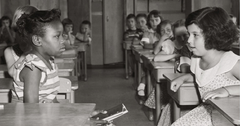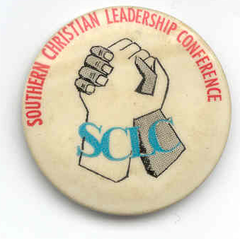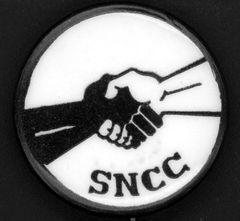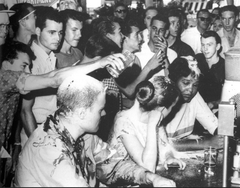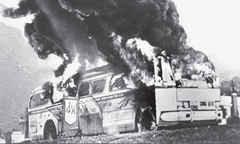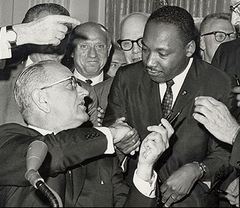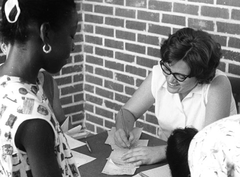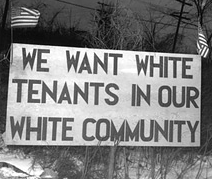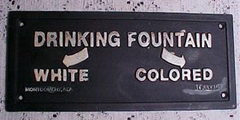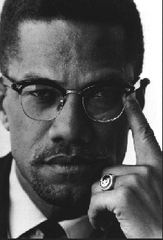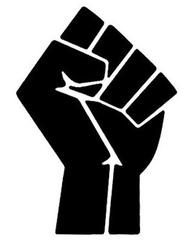Emmett Till
14 year old boy who was murdered in 1955 for whistling at a white woman by her husband and his friends. They kidnapped him and brutally killed him; his death led to the American Civil Rights movement.
Thurgood Marshall
NAACP legal counsel and the first African-American Supreme Court Justice
Brown v. Board of Education
1954 - The Supreme Court overruled Plessy v. Ferguson, declared that racially segregated facilities are inherently unequal and ordered all public schools desegregated.
Rosa Parks
NAACP member who initiated the Montgomery Bus Boycott in 1955 when she was arrested for violating Jim Crow rules on a bus; her action and the long boycott that followed became an icon of the quest for civil rights and focused national attention on boycott leader Martin Luther King, Jr.
Dr. Martin Luther King
United States civil rights leader and Baptist minister who campaigned against the segregation of Blacks (1929-1968). He preached non-violence and was assassinated by James Earl Ray.
SCLC
Southern Christian Leadership Conference, churches link together to inform blacks about changes in the Civil Rights Movement, led by MLK Jr., was a success
SNCC
Student Non-Violent Coordinating Committee, college kids participate in Civil Rights, stage sit-ins and such
sit-in
nonviolent protests in which a person sits and refuses to leave a segregated area until either served or arrested
freedom rider
African American and white college students (usually from northern states) rode buses through southern states to challenge segregation
Civil Rights Act of 1964
This act made racial, religious, and sex discrimination by employers illegal and gave the government the power to enforce all laws governing civil rights, including desegregation of schools and public places.
Freedom Summer
In 1964, when blacks and whites together challenged segregation and led a massive drive to register blacks to vote.
Voting Rights Act of 1965
a law designed to help end formal and informal barriers to African-American suffrage
de facto segregation
Segregation resulting from tradition and custom
de jure segregation
segregation that is imposed by law
Malcolm X
member of the Black Muslims. His promise to find equality for black Americans using "any means necessary" made him worrisome to whites in power. Later in life he changed his views about working with white America prior to being assassinated.
Nation of Islam
a group of militant Black Americans who profess Islamic religious beliefs and advocate independence for Black Americans
Stokely Carmichael
Became the leader of SNCC in 1966, popularizing the term "Black power". He initially favored integration and nonviolence, but grew more militant after he became the leader of the Black Panthers.
Black Power
a slogan used by Stokely Carmichael in the 1960s that encouraged African-American pride and political and social leadership
Kerner Commission
created in July, 1967 by President Lyndon B. Johnson to investigate the causes of the 1967 race riots in the United States
Civil Rights Act of 1968
this law banned discrimination in housing, the segregation of education, transportation, and employment, it helped African Americans gain their full voting rights.
affirmative action
a policy designed to redress past discrimination against women and minority groups through measures to improve their economic and educational opportunities
Little Rock 9
1957- First group of black students who were able to attend an all white school because President Eisenhower used the military to enforce the Brown v. Board of Education decision.
Black Panthers
Militant African-American political organization formed by founded in 1966 by Huey Newton and Bobby Seale to fight police brutality and provide services in the ghetto.
Fannie Lou Hamer
A SNCC organizer and former sharecropper who had been evicted from her farm after registering to vote & thrown in jail for urging other African Americans to register to vote; helped organize the Mississippi Freedom Democratic Party & challenged the legality of the segregated Democratic Party at the Democratic Convention.
James Meredith
1962: He was a civil rights advocate who spurred a riot at the University of Mississippi. The riot was caused by angry whites who did not want Meredith to register at the university. The result was forced government action, showing that segregation was no longer government policy.

